The Spiritual Value of Chinese Characters汉字五千年之华夏心灵
- 格式:doc
- 大小:31.00 KB
- 文档页数:4
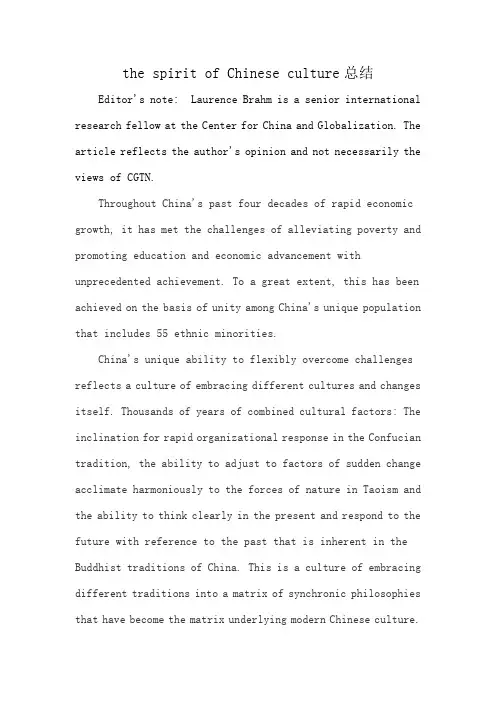
the spirit of Chinese culture总结Editor's note: Laurence Brahm is a senior international research fellow at the Center for China and Globalization. The article reflects the author's opinion and not necessarily the views of CGTN.Throughout China's past four decades of rapid economic growth, it has met the challenges of alleviating poverty and promoting education and economic advancement with unprecedented achievement. To a great extent, this has been achieved on the basis of unity among China's unique population that includes 55 ethnic minorities.China's unique ability to flexibly overcome challenges reflects a culture of embracing different cultures and changes itself. Thousands of years of combined cultural factors: The inclination for rapid organizational response in the Confucian tradition, the ability to adjust to factors of sudden change acclimate harmoniously to the forces of nature in Taoism and the ability to think clearly in the present and respond to the future with reference to the past that is inherent in the Buddhist traditions of China. This is a culture of embracing different traditions into a matrix of synchronic philosophies that have become the matrix underlying modern Chinese culture.The strength of the Chinese people lies in their culture and the natural resiliency of that culture. Taoism is about change. Buddhism is about seeing past-present-future simultaneously and turning negative situations into positive ones by realizing that everything is about how something is perceived.Confucianism gives Chinese people the organizational capability to respond to any situation and crisis and the longitudinal and latitudinal matrix of organization to respond to any situation and crisis. These are three aspects of the Chinese collective unconscious that are ever-present in everyone in China always, and that is a resilience that no Western country or people have.Another factor is the ability of the government to respond quickly to crisis through the matrix of organization that has been established from grassroots to the center of government since the founding of the People's Republic of China in 1949.This system of government organization is strong and resilient, as it is built upon the common and shared characteristics of the Chinese people that have become an inherent part of their culture and cultural response to all situations. These cultural factors make the Chinese peopleresilient and responsive to crisis. Their positivity allows them to turn each crisis into a new opportunity. And that is exactly what will happen as they overcome the COVID-19. Moreover, as they drive into a new era of health reform, community health outreach, research and technology development at every level, in re-building after the crisis.Thirty years ago, China was an impoverished and largely agricultural nation. China has removed 770 million poor people from poverty since its reform and opening up in the late 1970s. The target for 2021 has been to eliminate poverty altogether. China has become a model of growth and development. Such development is now concentrated on the rural areas, many of which are remote villages where ethnic groups that may have once felt left behind now have the opportunity to become the focus of development.Adopting Ecological Civilization policy as a response to pollution and climate change crisis, China has become a global leader in renewable energy and green finance. The emphasis on smart infrastructure to achieve commerce and connectivity has become a key to the Belt and Road Initiative that has brought so many developing nations together in a matrix seeking a common shared destiny of mankind.While the coronavirus has presented China with one of its most dangerous challenges in decades, it also has pushed upon China an opportunity for major health care improvements and reforms in insurance, pension, health benefits across the social spectrum. It also raises an additional security concern of health security alongside the traditional security concerns and the recently addressed environmental security.It is foreseeable that the years ahead will witness major reforms. Healthcare will become a new business driver for the economy together with all of the health infrastructure, training, research and development together with technology that will be required to meet the challenges of humanity. This is in the Chinese spirit of turning danger into opportunity when facing a crisis.I have both observed and participated in many of the reforms and policies of China to overcome challenges over the four decades living here. I have seen a consistent pattern of unity and cooperation among the Chinese people and the meticulous coordination of government policies when faced with a crisis or challenge. Experience has shown me, time and again, when a crisis occurs, China's leadership faces it with a rational clear-headedness. Something seems to kick into thesubconscious of both people, and they work together in synergy with the organizational institutions of government to overcome these moments of crisis.This pattern has been re-occurring throughout my life in China, and I believe that it is an innate aspect of the Chinese collective unconscious that has roots in Confucian tradition. Philosophical influences that are both Taoist and Buddhist embedded in the national cultural psyche allow for adept flexibility in response to a crisis and a vision of positive hope when faced with negative adversity. This ability to see positive through negative and to use that perception to turn even the most difficult situations into advantages is a deeply rooted part of Chinese culture and the collective unconscious of the Chinese people.At times of prosperity, when things are going well, everybody is out there doing their own thing. But in those moments of crisis, everybody comes together. This is unique to the Chinese culture that allows them to respond and work together. This is what we see happening during this incredible coronavirus crisis. Where on earth could you have so many people plus people stay at home and self-quarantine as part of a coordinated government policy? This represents a collectiveresponse to an unprecedented pandemic. There are very few places in the world where everyone can come together in a patient collective force. This is unique to China and its people.For example, during the height of the COVID-19 crisis in China, the government cordoned and locked down Hubei Province. It was an act of responsibility not only toward its own people but also to the global community. We are all now aware of the deathly potency of the novel coronavirus and the unexplainable occurrence of its rapid airborne spread.The ability to lock down and isolate is the first step to be able to contain any virus. But if you imagine the scale of what is happening in Hubei Province to prevent this from affecting other parts of China and the world as a whole, it is incredible. This is a true act of global humanitarian responsibility, even at China's own economic and social costs.When you talk about humanitarianism, it is an act in the global interest. It was Chinese culture, the social fabric of its people and the organizational capability of its institutions that allowed China to respond quickly, decisively and collectively to a crisis of unbelievable and unforeseeable proportion.Under such circumstances where the threat of this coronavirus is a threat to anybody, we can see everybody is collectively and patiently staying at home – self-isolating, working remotely from home, working around the dangers to meet this challenge. I don't think one would see this response in any of the Western countries whose politicians and mainstream media are so quick to criticize China for everything it does. This is a distinctive, collective response among people to work and bond together to get through this crisis together.One of the reasons China can respond so effectively is the system of macro-management that evolved to address economic reform but is now being used to address a health and humanitarian crisis. Throughout the 1980s-1990s, a system of state guidance of the economy evolved, together with checks and balances to prevent economic crisis and the ability to tighten and loosen valves to allow the market to function in free-flow, or to use administrative means to guide the market toward more stable conditions to prevent volatility. This is in the interest of everyone collectively rather than theself-interest of a few.These areas now offer more state and private investment opportunities, and there will be a new growth era withbreakthroughs in science, technology, and artificial intelligence for health care. I believe these are areas where China will lead in bringing together other countries of the region, such as India, where there are similar challenges with population concentrations, water and food security, and health care.We could see new regional growth and economic revitalization. It is a question of using negative to create positive. That is core to Chinese philosophy and culture. Remember one thing: Never underestimate the resilience of the Chinese people and the organizational capability of their government to meet a challenge head-on. I am not saying this as a theory. I have seen and lived this throughout my own four decades in this country. And I am seeing it again.。
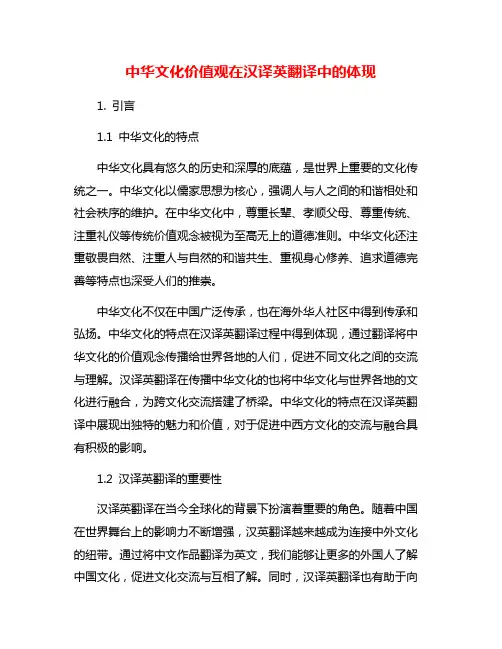
中华文化价值观在汉译英翻译中的体现1. 引言1.1 中华文化的特点中华文化具有悠久的历史和深厚的底蕴,是世界上重要的文化传统之一。
中华文化以儒家思想为核心,强调人与人之间的和谐相处和社会秩序的维护。
在中华文化中,尊重长辈、孝顺父母、尊重传统、注重礼仪等传统价值观念被视为至高无上的道德准则。
中华文化还注重敬畏自然、注重人与自然的和谐共生、重视身心修养、追求道德完善等特点也深受人们的推崇。
中华文化不仅在中国广泛传承,也在海外华人社区中得到传承和弘扬。
中华文化的特点在汉译英翻译过程中得到体现,通过翻译将中华文化的价值观念传播给世界各地的人们,促进不同文化之间的交流与理解。
汉译英翻译在传播中华文化的也将中华文化与世界各地的文化进行融合,为跨文化交流搭建了桥梁。
中华文化的特点在汉译英翻译中展现出独特的魅力和价值,对于促进中西方文化的交流与融合具有积极的影响。
1.2 汉译英翻译的重要性汉译英翻译在当今全球化的背景下扮演着重要的角色。
随着中国在世界舞台上的影响力不断增强,汉英翻译越来越成为连接中外文化的纽带。
通过将中文作品翻译为英文,我们能够让更多的外国人了解中国文化,促进文化交流与互相了解。
同时,汉译英翻译也有助于向世界传播中华文化的优秀价值观念,提升中国文化在国际社会中的影响力。
在今天的国际交往中,英语已成为一种重要的沟通工具。
许多中国作家、学者和影视制作人希望通过汉英翻译将自己的作品介绍给更广泛的国际读者和观众。
通过优秀的汉英翻译作品,我们可以为国际社会呈现出一个更加真实、立体的中国形象,让世界更加全面地了解中华文化的独特魅力。
因此,汉英翻译的重要性不仅仅在于传递信息,更在于传播文化、促进交流、增进理解。
通过优秀的翻译实践,我们可以更好地传承和弘扬中华文化的价值观念,让世界更好地理解和接纳中国。
2. 正文2.1 汉译英翻译中体现的中华文化传统价值观念汉译英翻译是一种将中华文化传统价值观念转化成英文表达的重要途径。
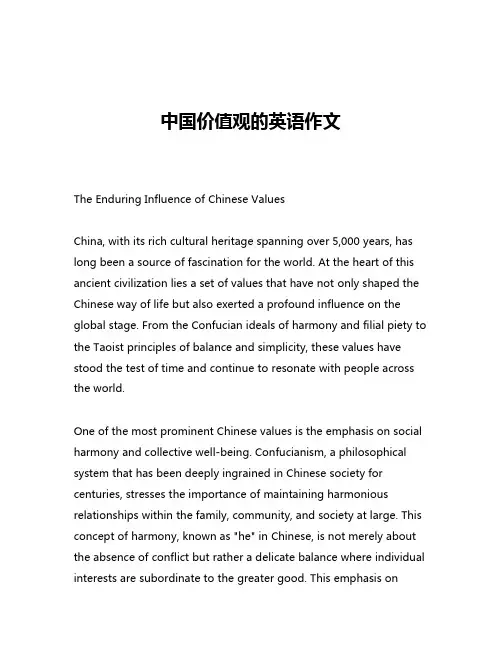
中国价值观的英语作文The Enduring Influence of Chinese ValuesChina, with its rich cultural heritage spanning over 5,000 years, has long been a source of fascination for the world. At the heart of this ancient civilization lies a set of values that have not only shaped the Chinese way of life but also exerted a profound influence on the global stage. From the Confucian ideals of harmony and filial piety to the Taoist principles of balance and simplicity, these values have stood the test of time and continue to resonate with people across the world.One of the most prominent Chinese values is the emphasis on social harmony and collective well-being. Confucianism, a philosophical system that has been deeply ingrained in Chinese society for centuries, stresses the importance of maintaining harmonious relationships within the family, community, and society at large. This concept of harmony, known as "he" in Chinese, is not merely about the absence of conflict but rather a delicate balance where individual interests are subordinate to the greater good. This emphasis onsocial cohesion and mutual responsibility has been instrumental in shaping China's approach to governance, where the state often takes a more active role in coordinating and guiding the nation's development.Closely linked to the idea of harmony is the Confucian value of filial piety, or "xiao." This concept encompasses a deep respect and devotion for one's parents and elders, as well as a sense of obligation to care for and support them. In traditional Chinese families, the well-being of the family unit is often prioritized over individual desires, and children are expected to honor their parents and contribute to the family's prosperity. This strong emphasis on family ties and intergenerational responsibilities has had a profound impact on Chinese society, influencing everything from caregiving practices to the structure of the workforce.Another key Chinese value that has gained global recognition is the Taoist principle of balance and harmony with nature. Taoism, an ancient philosophical and religious tradition, teaches the importance of living in harmony with the natural world and embracing the cyclical nature of life. This philosophy has influenced Chinese attitudes towards the environment, encouraging a more sustainable and holistic approach to resource management and environmental protection. The concept of "yin and yang," the complementary forces that underlie all of existence, has become a universal symbol ofbalance and the interconnectedness of all things.In recent years, as China has emerged as a global economic and political powerhouse, its traditional values have also gained increased attention on the international stage. Chinese leaders have actively promoted the country's cultural heritage, emphasizing the importance of these values in shaping China's approach to global affairs. For example, the concept of "win-win cooperation," which emphasizes mutual benefit and shared prosperity, has become a cornerstone of China's foreign policy, reflecting the Confucian ideal of creating a harmonious world order.Moreover, the Chinese values of hard work, thrift, and entrepreneurship have been instrumental in the country's remarkable economic transformation. The Confucian emphasis on education and self-improvement has contributed to the rise of a highly skilled and innovative workforce, while the Taoist appreciation for simplicity has encouraged a more balanced approach to economic development, one that prioritizes sustainability and long-term prosperity over short-term gains.As the world grapples with complex global challenges, from climate change to geopolitical tensions, the enduring influence of Chinese values has become increasingly relevant. The Confucian emphasis on social harmony and collective well-being offers a counterpoint to theindividualism that has dominated much of the Western world, while the Taoist principles of balance and harmony with nature provide a valuable framework for addressing environmental concerns.In conclusion, the Chinese values that have been passed down through generations continue to shape the country's domestic and international policies, offering a unique perspective on the complex issues facing the world today. Whether it is the Confucian ideal of harmony, the Taoist principle of balance, or the entrepreneurial spirit rooted in Chinese culture, these values have the potential to contribute to a more just, sustainable, and interconnected global community. As China's influence continues to grow, the world would do well to listen to the wisdom of its ancient traditions and embrace the enduring relevance of Chinese values.。
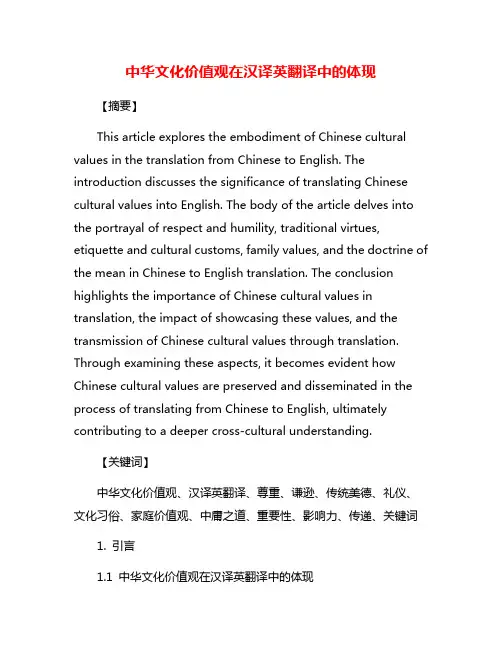
中华文化价值观在汉译英翻译中的体现【摘要】This article explores the embodiment of Chinese cultural values in the translation from Chinese to English. The introduction discusses the significance of translating Chinese cultural values into English. The body of the article delves into the portrayal of respect and humility, traditional virtues, etiquette and cultural customs, family values, and the doctrine of the mean in Chinese to English translation. The conclusion highlights the importance of Chinese cultural values in translation, the impact of showcasing these values, and the transmission of Chinese cultural values through translation. Through examining these aspects, it becomes evident how Chinese cultural values are preserved and disseminated in the process of translating from Chinese to English, ultimately contributing to a deeper cross-cultural understanding.【关键词】中华文化价值观、汉译英翻译、尊重、谦逊、传统美德、礼仪、文化习俗、家庭价值观、中庸之道、重要性、影响力、传递、关键词1. 引言1.1 中华文化价值观在汉译英翻译中的体现Chinese cultural values are deeply embedded in the art of translating from Chinese to English. This practice not only involves language skills but also requires an understanding of the values and beliefs that shape Chinese society. The translation process serves as a window through which the world can glimpse the rich tapestry of Chinese culture, with its emphasis on respect, humility, traditional virtues, etiquette, family values, and the concept of the Middle Way.2. 正文2.1 汉译英翻译中的尊重和谦逊In the process of translating Chinese into English, the values of respect and humility are often reflected. These values are deeply rooted in Chinese culture and play a significant role in shaping the language and communication styles of native Chinese speakers.2.2 汉译英翻译中的传统美德When translating texts that involve traditional Chinese virtues, translators often face the challenge of capturing the nuances and cultural connotations of these virtues in English. For example, the concept of "filial piety" (孝顺) goes beyond simply obeying and respecting one's parents; it encompasses the ideaof showing gratitude, reverence, and care for one's elders. Translating this complex concept into English requires more than just finding an equivalent word; it involves conveying the depth and complexity of the virtue in a way that resonates with English-speaking audiences.2.3 汉译英翻译中的礼仪和文化习俗In the translation of Chinese to English, the reflection of etiquette and cultural customs plays a significant role in conveying the values of Chinese culture. Etiquette and cultural customs are deeply rooted in Chinese society and have a long history dating back thousands of years. When translating these aspects into English, it is crucial to accurately capture the nuances and meanings behind the gestures and traditions.2.4 汉译英翻译中的家庭价值观家庭在中华文化中扮演着非常重要的角色,家庭价值观也是中华民族传统文化的核心。
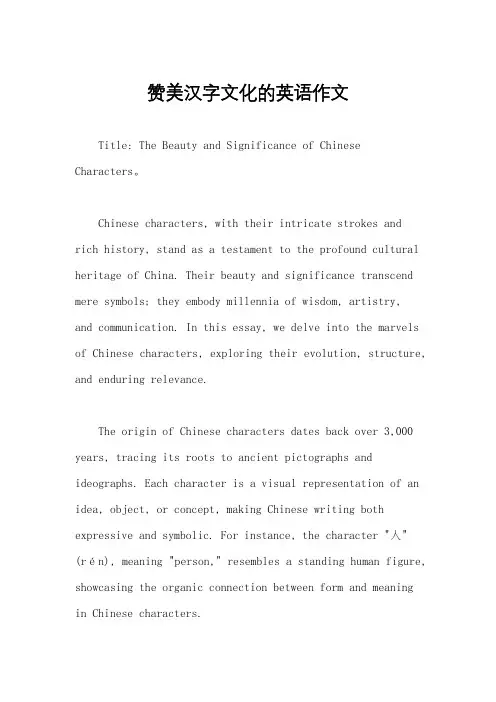
赞美汉字文化的英语作文Title: The Beauty and Significance of Chinese Characters。
Chinese characters, with their intricate strokes andrich history, stand as a testament to the profound cultural heritage of China. Their beauty and significance transcend mere symbols; they embody millennia of wisdom, artistry,and communication. In this essay, we delve into the marvels of Chinese characters, exploring their evolution, structure, and enduring relevance.The origin of Chinese characters dates back over 3,000 years, tracing its roots to ancient pictographs and ideographs. Each character is a visual representation of an idea, object, or concept, making Chinese writing both expressive and symbolic. For instance, the character "人"(rén), meaning "person," resembles a standing human figure, showcasing the organic connection between form and meaningin Chinese characters.One remarkable aspect of Chinese characters is their adaptability and versatility. Despite their ancient origins, they have evolved alongside the Chinese civilization, continually integrating new words and concepts. This adaptability is evident in the creation of compound characters, where two or more individual characters combine to form a new meaning. For example, the word "爱情"(àiqíng), composed of the characters for "love" and "emotion," encapsulates the complex concept of romantic love.Moreover, Chinese characters possess a unique aesthetic appeal, characterized by their balance, symmetry, and rhythmic flow. The graceful curves and precise angles of each stroke create a harmonious composition that is both visually captivating and intellectually stimulating. Calligraphy, the art of writing Chinese characters with brush and ink, further enhances their beauty, transforming written words into expressions of artistic mastery.Beyond their visual allure, Chinese characters serve ascustodians of cultural heritage and collective memory. They encapsulate the wisdom of sages, the narratives of history, and the values of a civilization. Through the study of classical texts such as the Analects of Confucius or the poetry of Li Bai, readers gain insights into the moral, philosophical, and artistic dimensions of Chinese culture.In contemporary times, Chinese characters continue to play a vital role in communication, education, and identity. Despite the advent of digital technologies and globalization, they remain an indispensable tool for expressing ideas, recording information, and preserving cultural heritage. The widespread adoption of Chinese characters in neighboring countries such as Japan, Korea, and Vietnam further attests to their enduring influence and universal appeal.Furthermore, the study of Chinese characters fosters cognitive benefits such as improved memory, attention to detail, and appreciation for cultural diversity. Learningto write Chinese characters requires discipline, patience, and perseverance, cultivating valuable skills that extendbeyond the realm of language acquisition.In conclusion, Chinese characters stand as a testament to the enduring legacy of one of the world's oldest civilizations. Their beauty, adaptability, and cultural significance make them not just symbols on a page butliving expressions of human creativity and ingenuity. As we continue to marvel at the wonders of Chinese characters,let us also cherish and preserve this invaluable heritage for generations to come.。
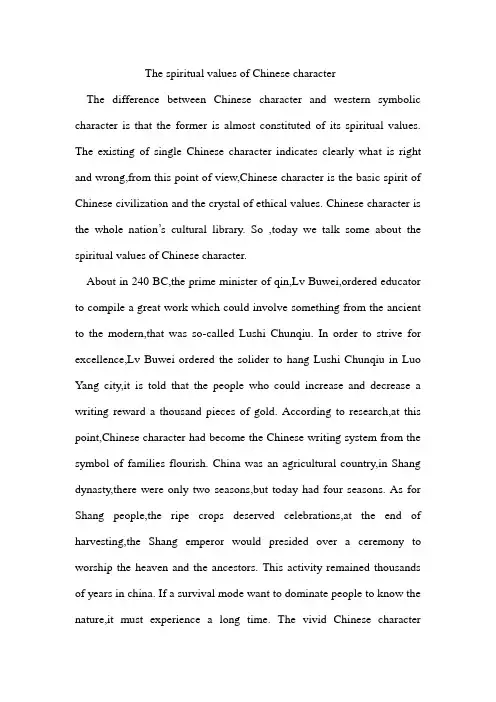
The spiritual values of Chinese characterThe difference between Chinese character and western symbolic character is that the former is almost constituted of its spiritual values. The existing of single Chinese character indicates clearly what is right and wrong,from this point of view,Chinese character is the basic spirit of Chinese civilization and the crystal of ethical values. Chinese character is the whole nation’s cultural library. So ,today we talk some about the spiritual values of Chinese character.About in 240 BC,the prime minister of qin,Lv Buwei,ordered educator to compile a great work which could involve something from the ancient to the modern,that was so-called Lushi Chunqiu. In order to strive for excellence,Lv Buwei ordered the solider to hang Lushi Chunqiu in Luo Yang city,it is told that the people who could increase and decrease a writing reward a thousand pieces of gold. According to research,at this point,Chinese character had become the Chinese writing system from the symbol of families flourish. China was an agricultural country,in Shang dynasty,there were only two seasons,but today had four seasons. As for Shang people,the ripe crops deserved celebrations,at the end of harvesting,the Shang emperor would presided over a ceremony to worship the heaven and the ancestors. This activity remained thousands of years in china. If a survival mode want to dominate people to know the nature,it must experience a long time. The vivid Chinese characterenabled us to face the agricultural survival of the ancient ancestors. At the very beginning,Western countries and china began to take different roads by nature’s gift. While western countries began to enter into industry countries,China still remained the farming life. So ,why the farming civilization existed a long time in china? At some point,it is related to the fertile Yellow Land,at the inscriptions on bones or tortoise shells of shang dynasty,the Chinese character of Yi is a picture of the cultivation of trees. The nature is mysterious and divine,the Chinese character Ren in the inscriptions on bones or tortoise shells of shang dynasty was described a picture of people’s obedience. People was a part of heaven,people could experience the heaven’s gifts in this four seasons.For ancient ancestors, the notion of a small family was luxurious,even a small family could not engage in farming desperately,for the backward means of production. Once the bad weather appeared,so it needed a big farming organization to engage in farming. Every family should take his social duty and be responsible to the society. What is duty? That is,you will dispatch troops and you will join it . Not only marching to war,but also living a life,it must build some rules. Although the Home began from big family,but what the time did the small family begin to separate? As the advent of metal tools,especially the appearance of iron,iron plough was the cause of this great change. Another reason is the appearance of the feudalism’s breakdown,politically,the dynasty began to disintegratebig family in order to stable his dominance. Culture and ethics both belong to heritage.maybe our ancient ancestors use Zi replacing Wen,so we can record the symbol system of language.Once King Wen of Zhou go to royal progress,he saw a corpse half the way,he ordered attendants to bury him,but his attendants said,it is a nameless corpse,King Wen of Zhou was very unhappy,he said,I am the king of a country,it means the head of a big family. While there had emperor,there also had attendants. It seemed like a small family separate from a big family,the official position also separate from administrative family.The western humanism goes against religions and Christian,on the other hand,it had the spirit of conquering the nature,however,china stands for Ru spirit,it belongs to humanism and nature. So ,some scholars thought,contrast to western civilization,the Chinese civilization pursues the spiritual values of inner heart and ethics,in a word,they both remain great and rich legacy.。
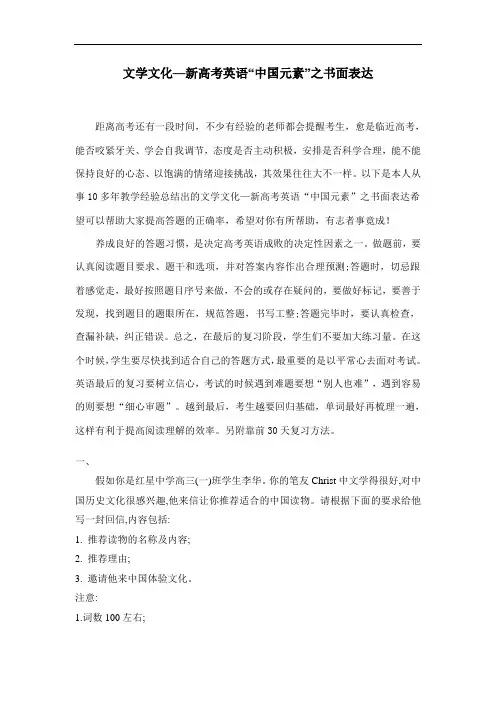
文学文化—新高考英语“中国元素”之书面表达距离高考还有一段时间,不少有经验的老师都会提醒考生,愈是临近高考,能否咬紧牙关、学会自我调节,态度是否主动积极,安排是否科学合理,能不能保持良好的心态、以饱满的情绪迎接挑战,其效果往往大不一样。
以下是本人从事10多年教学经验总结出的文学文化—新高考英语“中国元素”之书面表达希望可以帮助大家提高答题的正确率,希望对你有所帮助,有志者事竟成!养成良好的答题习惯,是决定高考英语成败的决定性因素之一。
做题前,要认真阅读题目要求、题干和选项,并对答案内容作出合理预测;答题时,切忌跟着感觉走,最好按照题目序号来做,不会的或存在疑问的,要做好标记,要善于发现,找到题目的题眼所在,规范答题,书写工整;答题完毕时,要认真检查,查漏补缺,纠正错误。
总之,在最后的复习阶段,学生们不要加大练习量。
在这个时候,学生要尽快找到适合自己的答题方式,最重要的是以平常心去面对考试。
英语最后的复习要树立信心,考试的时候遇到难题要想“别人也难”,遇到容易的则要想“细心审题”。
越到最后,考生越要回归基础,单词最好再梳理一遍,这样有利于提高阅读理解的效率。
另附靠前30天复习方法。
一、假如你是红星中学高三(一)班学生李华。
你的笔友Christ中文学得很好,对中国历史文化很感兴趣,他来信让你推荐适合的中国读物。
请根据下面的要求给他写一封回信,内容包括:1. 推荐读物的名称及内容;2. 推荐理由;3. 邀请他来中国体验文化。
注意:1.词数100左右;2.开头和结尾己给出,不计入总词数。
Dear Christ,_____________________________________________________________________ _____________________________________________________________________ _____________________________________________________________________ _____________________________________________________________________ _____________________________________________________________________ _____________________________________________________________________ 二、假定你是李华,你校将举办“中国古典名著研讨会”活动。
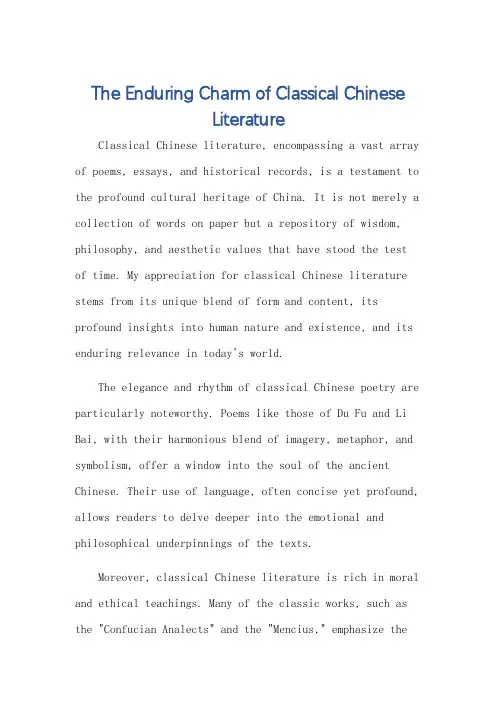
The Enduring Charm of Classical ChineseLiteratureClassical Chinese literature, encompassing a vast array of poems, essays, and historical records, is a testament to the profound cultural heritage of China. It is not merely a collection of words on paper but a repository of wisdom, philosophy, and aesthetic values that have stood the test of time. My appreciation for classical Chinese literature stems from its unique blend of form and content, its profound insights into human nature and existence, and its enduring relevance in today's world.The elegance and rhythm of classical Chinese poetry are particularly noteworthy. Poems like those of Du Fu and Li Bai, with their harmonious blend of imagery, metaphor, and symbolism, offer a window into the soul of the ancient Chinese. Their use of language, often concise yet profound, allows readers to delve deeper into the emotional and philosophical underpinnings of the texts.Moreover, classical Chinese literature is rich in moral and ethical teachings. Many of the classic works, such as the "Confucian Analects" and the "Mencius," emphasize theimportance of benevolence, righteousness, and wisdom as the fundamental principles of human conduct. These teachings, while ancient, are still relevant today, serving as a guide for moral decision-making and personal growth.The historical value of classical Chinese literature is also immense. Works like the "Records of the Grand Historian" and the "Chronicles of the Three Kingdoms" provide a detailed account of China's rich historical narrative, offering insights into the political, social, and cultural developments of different eras. Thesehistorical records not only preserve the memory of the past but also serve as a bridge between generations, connecting us to our ancestors and their wisdom.In the modern era, where technology and globalization have brought about rapid changes, the relevance ofclassical Chinese literature might seemquestionable. However, I believe that its value is undiminished. The insights and wisdom contained in these classic works provide a much-needed counterbalance to the fast-paced and often materialistic world we live in. They encourage us to reflect on the deeper meanings of life, to appreciate thebeauty and harmony in nature and art, and to uphold moral and ethical values in our actions.In conclusion, classical Chinese literature is a treasure trove of wisdom and beauty that deserves our attention and appreciation. Its enduring charm lies in its ability to speak to us across the ages, offering insights into human nature and existence that are as relevant today as they were centuries ago. As we embrace the challengesand opportunities of the modern world, let us not forgetthe rich cultural heritage that has shaped us and continues to guide us on our journey.**中国古典文学的永恒魅力**中国古典文学,包括诗歌、散文和历史记录等丰富多样的内容,是中国深厚文化遗产的见证。
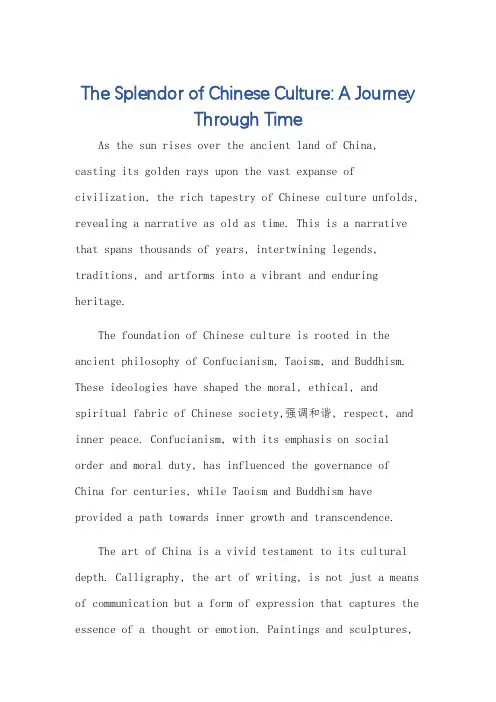
The Splendor of Chinese Culture: A JourneyThrough TimeAs the sun rises over the ancient land of China, casting its golden rays upon the vast expanse of civilization, the rich tapestry of Chinese culture unfolds, revealing a narrative as old as time. This is a narrative that spans thousands of years, intertwining legends, traditions, and artforms into a vibrant and enduring heritage.The foundation of Chinese culture is rooted in the ancient philosophy of Confucianism, Taoism, and Buddhism. These ideologies have shaped the moral, ethical, and spiritual fabric of Chinese society,强调和谐, respect, and inner peace. Confucianism, with its emphasis on social order and moral duty, has influenced the governance of China for centuries, while Taoism and Buddhism have provided a path towards inner growth and transcendence.The art of China is a vivid testament to its cultural depth. Calligraphy, the art of writing, is not just a means of communication but a form of expression that captures the essence of a thought or emotion. Paintings and sculptures,often inspired by nature and mythology, exhibit a profound understanding of aesthetics and symbolism. The intricate details of Chinese architecture, from the Forbidden City to the Terracotta Army, reflect a profound respect for history and tradition.Music and dance in China are as diverse as they are enchanting. The sound of the guqin, a traditional Chinese string instrument, resonates with a melancholy beauty that tells tales of love and longing. The grace and elegance of Chinese dance, whether it's the flowing sleeves of a qipao or the precision moves of martial arts, embody the spirit of Chinese culture.Food is another integral part of Chinese culture, with a cuisine that is both diverse and delicious. From the spicy Sichuan dishes to the sweet and sour flavors of Guangdong, Chinese food is a culinary adventure that explores the flavors of the land and the heart. The preparation of food, often a family affair, is a way of maintaining传统 and passing down generations of wisdom and love.The festivals and traditions of China are vibrant displays of community and culture. The Spring Festival, marked by fireworks, dragon dances, and family reunions, symbolizes the beginning of a new year and the continuation of old traditions. The Mid-Autumn Festival, with its mooncakes and lanterns, is a time for reflection and gratitude. These festivals are not just celebrations but a way of life, connecting people to their past and to each other.In the modern era, Chinese culture has continued to evolve and adapt, while maintaining its essential characteristics. The blend of traditional and contemporary elements in Chinese art, music, and fashion is a testament to this cultural resilience. Chinese cinema, with its unique blend of storytelling and visual aesthetics, has captivated global audiences, showcasing the power of Chinese creativity and innovation.In conclusion, the splendor of Chinese culture is not just a testament to the rich history and diversity of this ancient civilization but also a beacon of inspiration for the world. As we delve into the depths of Chinese culture,we are reminded of the enduring value of tradition and the infinite possibilities of human creativity.**中华文化之辉煌:穿越时空的旅程**当太阳升起,照耀在古老的中国大地之上,把金黄的阳光洒向这片广袤的文明,中华文化的绚烂画卷便徐徐展开,讲述着一个古老而永恒的故事。
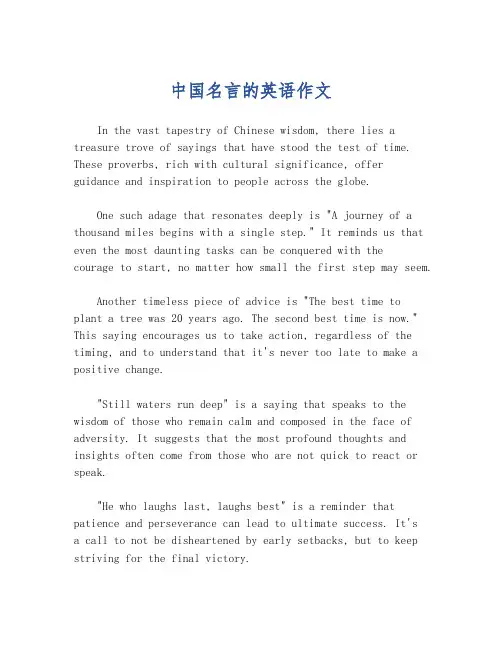
中国名言的英语作文In the vast tapestry of Chinese wisdom, there lies a treasure trove of sayings that have stood the test of time. These proverbs, rich with cultural significance, offer guidance and inspiration to people across the globe.One such adage that resonates deeply is "A journey of a thousand miles begins with a single step." It reminds us that even the most daunting tasks can be conquered with thecourage to start, no matter how small the first step may seem.Another timeless piece of advice is "The best time toplant a tree was 20 years ago. The second best time is now." This saying encourages us to take action, regardless of the timing, and to understand that it's never too late to make a positive change."Still waters run deep" is a saying that speaks to the wisdom of those who remain calm and composed in the face of adversity. It suggests that the most profound thoughts and insights often come from those who are not quick to react or speak."He who laughs last, laughs best" is a reminder that patience and perseverance can lead to ultimate success. It'sa call to not be disheartened by early setbacks, but to keep striving for the final victory."The pen is mightier than the sword" is a powerful statement that highlights the impact of communication and the written word. It suggests that ideas and words have the power to change the world more than brute force ever could."A rolling stone gathers no moss" is a metaphor that encourages continuous movement and growth. It warns against complacency, urging us to keep learning and evolving to avoid stagnation."The early bird catches the worm" is a reminder of the benefits of diligence and promptness. It suggests that those who rise early and seize the day are more likely to succeed.In conclusion, Chinese proverbs are not just words; they are a reflection of a culture's collective wisdom. They serve as a compass, guiding us through life's complexities with their profound insights.。
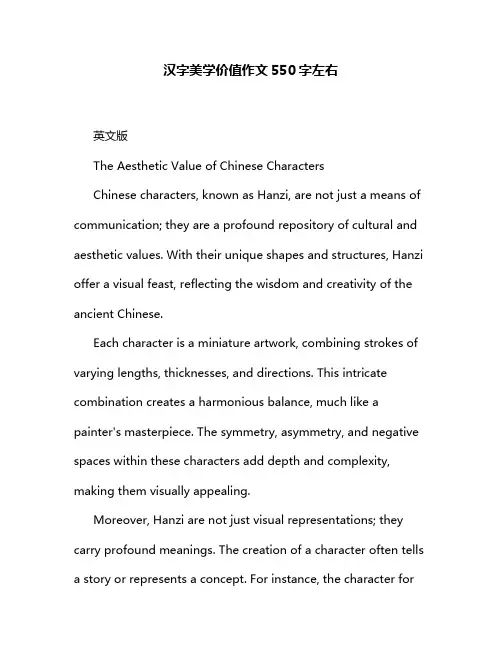
汉字美学价值作文550字左右英文版The Aesthetic Value of Chinese CharactersChinese characters, known as Hanzi, are not just a means of communication; they are a profound repository of cultural and aesthetic values. With their unique shapes and structures, Hanzi offer a visual feast, reflecting the wisdom and creativity of the ancient Chinese.Each character is a miniature artwork, combining strokes of varying lengths, thicknesses, and directions. This intricate combination creates a harmonious balance, much like a painter's masterpiece. The symmetry, asymmetry, and negative spaces within these characters add depth and complexity, making them visually appealing.Moreover, Hanzi are not just visual representations; they carry profound meanings. The creation of a character often tells a story or represents a concept. For instance, the character for"water" depicts the flow of water, symbolizing its continuous movement and adaptability. This association of form and meaning further enhances the aesthetic value of Hanzi.In addition, Hanzi are dynamic. They evolve over time, adapting to the needs of society and reflecting changes in culture and technology. This evolution ensures that Hanzi remain relevant and engaging, maintaining their aesthetic appeal across generations.In conclusion, the aesthetic value of Hanzi lies in their unique shapes, profound meanings, and dynamic nature. They are not just a means of communication; they are a window to the rich and vibrant cultural heritage of China.中文版汉字的美学价值汉字,又称作汉字,不仅仅是沟通的工具,更是文化和美学价值的深厚载体。
提炼展示中华文明的精神标识和文化精髓英语The Spirit Symbols and Cultural Essence of Chinese CivilizationIntroductionChinese civilization is one of the world's oldest continuous cultures, with a rich history spanning thousands of years. Throughout its history, China has been known for its unique traditions, values, and cultural practices, which have shaped the country's identity and influenced many aspects of global culture. In this article, we will explore the spirit symbols and cultural essence of Chinese civilization, examining how they continue to shape modern China and resonate with people around the world.Spirit Symbols of Chinese CivilizationThe spirit symbols of Chinese civilization are a unique combination of traditional beliefs, values, and practices that have been passed down through generations. These symbols serve as a guide for individual behavior and societal norms, reflecting the core principles of Chinese culture. One of the most prominent spirit symbols of Chinese civilization is the concept of harmony, which emphasizes the importance of balance and peace in allaspects of life. In Chinese culture, harmony is seen as essential for maintaining order and stability within society, as well as creating a sense of unity and cooperation among individuals.Another key spirit symbol of Chinese civilization is the concept of filial piety, which emphasizes the importance of respecting and honoring one's parents and ancestors. Filial piety is a core value in Chinese culture, as it is believed to foster strong family bonds and promote a sense of duty and loyalty among family members. Additionally, the concept of loyalty is also a vital spirit symbol of Chinese civilization, as it underscores the importance of remaining faithful and devoted to one's country, family, and friends.Cultural Essence of Chinese CivilizationThe cultural essence of Chinese civilization is a rich tapestry of traditions, customs, and artistic expressions that have been developed over thousands of years. One of the most prominent aspects of Chinese cultural essence is its long history of artistic and intellectual achievements, which have produced some of the world's most iconic works of literature, art, and philosophy. For example, Chinese literature is renowned for its classical poetry, which is characterized by its elegant language, intricate rhyme schemes, and profound themes.In addition to literature, Chinese civilization is also known for its rich tradition of visual arts, including painting, calligraphy, and sculpture. Chinese paintings often depict scenes of nature, such as mountains, rivers, and flowers, and are renowned for their use of color, texture, and symbolism. Calligraphy, on the other hand, is a highly respected art form in China, as it is seen as a way to convey one's inner thoughts and emotions through the careful arrangement of characters and strokes.Furthermore, Chinese civilization is also famous for its culinary traditions, which include a wide variety of dishes and cooking techniques that have been developed over centuries. Chinese cuisine is characterized by its use of fresh ingredients, bold flavors, and diverse cooking styles, with regional variations that reflect the country's vast geography and cultural diversity.Impact of Chinese Civilization on the WorldThe spirit symbols and cultural essence of Chinese civilization have had a profound impact on the world, influencing countless aspects of global culture, politics, and society. Chinese philosophy, particularly Confucianism and Taoism, has shaped the moral and ethical values of many societies around the world, emphasizing the importance of benevolence, righteousness, and harmony in interpersonal relationships.Chinese art and literature have also made significant contributions to the world's cultural heritage, inspiring artists, writers, and thinkers from diverse backgrounds. Chinese martial arts, such as kung fu and tai chi, have become popular worldwide for their focus on discipline, self-control, and physical fitness.Furthermore, Chinese cuisine has become a global phenomenon, with Chinese restaurants and food products found in almost every corner of the world. Chinese tea, in particular, has gained international recognition for its health benefits and elegant flavors, becoming a symbol of Chinese culture and hospitality.ConclusionIn conclusion, the spirit symbols and cultural essence of Chinese civilization are unique and enduring aspects of a rich and ancient culture that continues to inspire and influence people around the world. Through its values, traditions, and artistic expressions, Chinese civilization embodies a timeless wisdom that resonates with individuals seeking harmony, beauty, and meaning in their lives. As China continues to evolve and modernize, its cultural heritage remains a vital source of inspiration and pride for the Chinese people and a source of fascination and admiration for people around the world.。
中国文化富含什么精神英语作文Chinese Culture: A Tapestry of Profound Wisdom and Enduring TraditionsChina's rich and ancient culture is a testament to the enduring spirit of its people. Deeply rooted in a millennia-old history, Chinese culture has evolved over time, seamlessly blending tradition and modernity. At the heart of this captivating cultural landscape lies a tapestry of profound wisdom and enduring traditions that have profoundly shaped the Chinese way of life.One of the most striking aspects of Chinese culture is its reverence for harmony and balance. This principle, known as "Yin and Yang," permeates every facet of Chinese thought and practice. The idea of achieving equilibrium between opposing forces – such as light and dark, masculine and feminine, or the material and the spiritual – is a fundamental tenet that guides Chinese philosophy, art, and even daily life. This pursuit of harmony is evident in the graceful design of traditional Chinese gardens, the delicate balance of flavors in Chinese cuisine, and the fluid movements of practices like Tai Chi.Closely tied to the concept of harmony is the Chinese emphasis onthe collective over the individual. In contrast to the Western emphasis on individualism, Chinese culture places a high value on social cohesion and the well-being of the community as a whole. This is reflected in the importance placed on family, the respect for elders, and the strong sense of social responsibility that is deeply ingrained in the Chinese psyche. The Confucian principles of filial piety, loyalty, and benevolence are cornerstones of this collectivist ethos, shaping the way Chinese people interact with one another and their broader social circles.Another defining aspect of Chinese culture is its profound reverence for tradition and history. The Chinese people have a deep-seated respect for their ancestral roots, with a strong sense of cultural continuity that has endured for millennia. This reverence is manifested in the preservation of ancient customs, the veneration of historical figures, and the importance placed on the study of classical texts and literature. From the intricate calligraphy and painting traditions to the elaborate rituals and festivals, Chinese culture is a living testament to the enduring power of tradition.Underlying this rich cultural tapestry is a profound spirituality that has shaped the Chinese worldview. The three major philosophical and religious traditions of China – Confucianism, Taoism, and Buddhism – have each contributed to the development of a unique spiritual consciousness. Confucianism emphasizes the cultivation ofmoral virtue and the harmony of social relationships, while Taoism celebrates the natural world and the pursuit of inner peace. Buddhism, with its emphasis on enlightenment and the interconnectedness of all things, has also left an indelible mark on Chinese spirituality. These diverse spiritual traditions have coexisted and intertwined, creating a multifaceted spiritual landscape that has informed the Chinese understanding of the self, the universe, and the human experience.Lastly, the ingenuity and creativity of the Chinese people have been a driving force behind the enduring legacy of Chinese culture. From the groundbreaking inventions of ancient China, such as paper, printing, and the compass, to the artistic masterpieces that have captivated the world, the Chinese have consistently demonstrated a remarkable capacity for innovation and artistic expression. The Chinese have long been at the forefront of technological and cultural advancements, leaving an indelible mark on the global stage.In conclusion, Chinese culture is a rich tapestry of profound wisdom and enduring traditions. Its reverence for harmony and balance, its emphasis on the collective over the individual, its deep respect for tradition and history, its multifaceted spiritual consciousness, and its enduring legacy of ingenuity and creativity all contribute to the unique and captivating nature of Chinese culture. As the world continues to evolve, the enduring spirit of Chinese culture remains abeacon of inspiration, offering a timeless perspective on the human experience.。
中国优秀传统文化高中英语作文Title: The Splendor of Chinese Traditional CultureChina, a civilization with a history spanning over five thousand years, is home to a rich and diverse traditional culture that has been passed down from generation to generation. This cultural tapestry is woven with the threadsof philosophy, literature, art, music, and rituals, all contributing to the country's unique identity and charm.One of the cornerstones of Chinese culture is Confucianism, a philosophical system developed by Confuciusin the Spring and Autumn period. Confucianism emphasizes the importance of moral values such as benevolence, righteousness, propriety, wisdom, and trust. These principles have shapedthe social conduct and ethical standards of the Chinesepeople for centuries, influencing everything from family dynamics to government policies.In the realm of literature, China boasts a vastcollection of classical texts that are not only treasures of wisdom but also masterpieces of language. Works like "The Analects," "The Great Learning," and "The Art of War" by Sun Tzu have not only guided generations of Chinese scholars but also captivated readers worldwide with their timelessinsights into human nature and society.Art in China is another testament to its rich cultural heritage. Chinese painting, with its emphasis on brushwork and the use of ink, has a distinctive style that reflects the natural world and the philosophical ideas of the artists. Calligraphy, often regarded as the highest form of visual art in China, is a practice where the beauty of written characters is elevated to an art form. Each stroke of the brush captures not just the essence of the word but also the mood and temperament of the calligrapher.Music, too, holds a significant place in Chinese tradition. Instruments like the guqin (a seven-stringed zither), the dizi (a bamboo flute), and the erhu (a two-stringed fiddle) are integral to the country's musical heritage. These instruments produce sounds that are deeply connected to the Chinese landscape and evoke emotions that resonate with the listeners' souls. Traditional Chinese music often tells stories or expresses the composer's feelings about nature, love, or life itself.Ceremonies and rituals are also an essential part of Chinese culture. The Dragon Boat Festival, the Mid-Autumn Festival, and the Spring Festival (Chinese New Year) are just a few examples of the many celebrations that bring communities together. Each festival has its unique customs, such as dragon boat racing, mooncake eating, or the exchange of red envelopes containing money. These traditions not only serve as a way to mark the passage of time but also to reinforce familial and communal bonds.Furthermore, Chinese martial arts, or Wushu, are a fascinating aspect of traditional culture. Practices like Tai Chi Chuan and Kung Fu combine physical exercise withspiritual development, emphasizing the harmony between body and mind. These martial arts forms are not just about self-defense; they are also a means to achieve inner peace and balance.Finally, the culinary arts in China are renowned worldwide for their diversity and complexity. Chinese cuisine varies greatly from region to region, with each area offering its own flavors and specialties. From the spicy Sichuan dishes to the delicate Cantonese dim sum, Chinese food is an integral part of the country's cultural identity and a source of pride for its people.In conclusion, the splendor of Chinese traditionalculture lies in its ability to transcend time and space, connecting past, present, and future. It is a livingtestimony to the creativity and resilience of the Chinese people, who continue to cherish and cultivate their cultural legacy while embracing the challenges and opportunities of the modern world. This cultural wealth not only enriches China but also contributes to the global tapestry of human civilization, offering lessons and inspirations that are relevant to us all.。
Introducing Chinese Literary ClassicsThrough DeliIn the vast realm of Chinese culture, literature stands as a towering monument, a testament to the depth andbreadth of the nation's intellectual and emotional heritage. Deli, a term often associated with the delicate flavors of Chinese cuisine, can also serve as a metaphor forintroducing the intricate and engaging world of Chinese literary classics.Deli, in its essence, is a blend of various flavors and techniques, each contributing to the overall harmony and taste of a dish. Similarly, Chinese literature is atapestry of diverse genres, styles, and themes, each reflecting a unique facet of the country's rich cultural history. From ancient poetry to modern novels, these works offer insights into the lives, thoughts, and feelings ofthe Chinese people throughout the ages.At the core of Chinese literary classics are the worksof poetry, which date back thousands of years. The "Shijing" (Book of Songs), compiled during the Western Zhou Dynasty, is a collection of ancient folk songs and hymnsthat offer a glimpse into the lives and beliefs of early Chinese society. The "Chuci" (Songs of the South), written by Qu Yuan in the Warring States Period, is renowned forits lyrical and emotional quality, expressing the author's profound patriotism and sorrow over the decline of his nation.Moving forward in time, we encounter the Tang and Song dynasties, eras that are renowned for their poetry. Poets like Du Fu and Li Bai, known as the "Poet Immortal," left behind a legacy of profound and beautiful verses that are still recited and admired today. Their works, filled with imagery and metaphor, capture the essence of human emotions and experiences in a way that transcends time and culture. The transition from poetry to prose in Chineseliterature is marked by the rise of the novel. The "Romance of the Three Kingdoms," written by Luo Guanzhong in thelate Yuan and early Ming dynasties, is a historical epic that retells the events of the Three Kingdoms period through the lives of its heroes. This work, along with other classical novels like "Water Margin" and "Dream ofthe Red Chamber," established the foundation for the development of modern Chinese fiction."Dream of the Red Chamber," often considered the pinnacle of Chinese literature, is a masterful portrayal of the decline of a noble family and the complexities of human relationships. Its intricate plotting, rich characters, and profound themes have made it a favorite of scholars and readers alike.In addition to these canonical works, Chineseliterature is also rich in folk tales, legends, and ballads that have been passed down through generations. These stories, often containing elements of fantasy and mythology, reflect the imagination and creativity of the Chinese people.Deli, in its ability to combine diverse flavors and techniques into a harmonious whole, offers a apt metaphorfor the diversity and unity of Chinese literary classics. Just as a delicious meal is composed of various ingredients that complement each other, Chinese literature is atapestry of different genres and styles that together forma coherent and enchanting narrative of the Chinese cultural heritage.By delving into these literary classics, we not only gain insights into the past but also connect with the present and future of Chinese culture. The themes, characters, and ideas presented in these works resonate with us across time and space, reminding us of the enduring value of literature in shaping our understanding of the world and ourselves.In conclusion, Deli, as a metaphor for introducing Chinese literary classics, highlights the rich tapestry of genres, styles, and themes that make up the core of Chinese cultural heritage. Through exploring these works, we embark on a journey that takes us through the ages, connecting us with the past while also inspiring us to appreciate and cherish the beauty and wisdom of Chinese literature.**通过Deli介绍中国文学经典**在博大精深的中国文化中,文学如同一座巍峨的纪念碑,见证了中华民族智慧和情感的深厚底蕴。
中国经典文学英语作文Chinese classic literature is a treasure trove of wisdom, history, and cultural richness that has captivated readersfor centuries. It is a body of work that not only provides a window into the past but also offers profound insights into the human condition. In this essay, we will explore the significance of Chinese classic literature and its impact on both Eastern and Western cultures.One of the most revered works in Chinese literature is "The Four Great Classical Novels," which include "Romance of the Three Kingdoms," "Water Margin," "Journey to the West," and "Dream of the Red Chamber." Each of these novels offers a unique perspective on Chinese society, politics, and philosophy."Romance of the Three Kingdoms," written by Luo Guanzhong, is an epic historical novel set against the backdrop of the turbulent years towards the end of the Han Dynasty and the Three Kingdoms period in Chinese history. It is a tale of heroism, loyalty, and the struggle for power, which has inspired numerous adaptations and continues to be a source of fascination for its intricate plot and well-drawn characters."Water Margin," also known as "Outlaws of the Marsh," by Shi Nai'an, is a novel that tells the stories of 108 outlaws who gather at Mount Liang to form a sizable army against the corrupt government officials. It is a story that delves intothemes of justice, camaraderie, and rebellion, and it has resonated with readers for its portrayal of the underdog's fight against injustice."Journey to the West," attributed to Wu Cheng'en, is a mythological novel based on the legendary pilgrimage of the Tang dynasty Buddhist monk Xuanzang, who travels to the'Western Regions' to obtain sacred texts and returns after encountering eighty-one trials. The novel is a blend of adventure, allegory, and humor, and it has been influential in the development of both Chinese and Asian folklore.Lastly, "Dream of the Red Chamber," written by Cao Xueqin, is a semi-autobiographical novel that offers a detailed view of the life and social structures of 18th-century Chinese aristocracy. It is known for its psychological depth and its critique of the feudal system, as well as for its rich portrayal of the characters, particularly the tragic love story between the protagonist Jia Baoyu and his cousin Lin Daiyu.The influence of Chinese classic literature extends beyond China's borders. Many of these works have been translatedinto various languages, and they have inspired a range of adaptations in different cultural contexts. They have also contributed to the global understanding of Chinese thought, including concepts such as Confucianism, Taoism, and the importance of harmony and balance in life.In conclusion, Chinese classic literature is a rich and diverse field that offers a wealth of knowledge and culturalheritage. It is a testament to the enduring power of storytelling and the universal appeal of themes such as love, loyalty, and the quest for knowledge. As we continue to explore these classics, we gain not only a deeper appreciation for Chinese culture but also a greater understanding of the common threads that connect us all as human beings.。
中国人的精神作文英文版The spirit of the Chinese people is resilient and enduring, shaped by thousands of years of history and culture. It is a spirit that values harmony, perseverance, and a strong sense of community.In times of adversity, the Chinese people have always shown remarkable resilience and determination. Whether it's overcoming natural disasters or facing political upheaval, the Chinese spirit remains unbroken and unwavering.The Chinese people have a deep respect for tradition and heritage, drawing strength from the wisdom of their ancestors. This reverence for the past is reflected in the Chinese value of filial piety and the importance placed on family and community.At the same time, the Chinese spirit is also forward-thinking and innovative. China's rapid economic development and technological advancements are a testament to theentrepreneurial and enterprising nature of the Chinese people.In the face of challenges, the Chinese people demonstrate remarkable adaptability and resourcefulness. From ancient times to the present day, they have shown an ability to find creative solutions to complex problems.The Chinese spirit is also characterized by a deep sense of pride and patriotism. Chinese people take great pride in their rich cultural heritage and are fiercely protective of their national identity.Despite the immense diversity within China, the Chinese people share a common set of values and beliefs that have been passed down through generations. This shared sense of identity has been a source of strength and unity for the Chinese people.The Chinese spirit is deeply rooted in the land and the natural world. Chinese philosophy and traditional medicine are based on the idea of harmony between humans and nature,reflecting a deep respect for the environment.The Chinese people have a strong sense of community and mutual support. Whether it's coming together to celebrate festivals or rallying together in times of crisis, the Chinese spirit is deeply communal and interconnected.In conclusion, the spirit of the Chinese people is multifaceted and complex, drawing on a rich tapestry of history, culture, and tradition. It is a spirit that is marked by resilience, adaptability, and a deep sense of pride and community.。
The Spiritual Value of Chinese Characters The fourth part of Five Thousands Years of Chinese Characters is called Heart and Spirit of Chinese People.The theme of this part is to dig out and explain the spiritual value of Chinese characters.And also the Chinese culture pursues the internal transcendence.The difference between the signals of Chinese and Western lies in that every Chinese character is composed of spiritual value,and every Chinese character can tell you what is wrong or right and its statue in Chinese traditional culture.However,the signal of Western world has not the unique feature.BC240,Lv Buwei,the prime minister of Qin dynasty,called called for intellectuals to write a book which included everything in history,namely,Lv’s commentaries of History.He hanged in the the grate of the town Xianyang and said if anyone who can delete one word or plus one word to the great book,then the one can get a thousand gold for reward.At that time,the character(in Chinese“字”)developed from the symbol of prosperity of families to the generic term for the writing of Chinese characters.The Chinese character(字)implies concrete meaning.Such as,the character winter(冬)meant the ending of things before it used as a season in West Zhou.Eighty eight cellars were found in Hu Bei province.Some professors estimate more than 130 thousand Chinese jin millet can berestored in these cellars,which showed how flourishing the northern agriculture was at ancient time.In some Chinese characters,we can the shadows of agricultural tools.Chinese characters recorded Chinese agriculture clearly.In agrarian time,the level of productive force was quite low,the agriculture,in great degree,depended on nature,so people at that time preyed for blessing of Haven.The character human(ren/人) was created with the meaning of being reverent and respectful to Haven.Everything is developed in the order of being small to being big,but actually the core family is developed from the extensive family.The core family can not defend the natural disasters alone,so in agrarian time,people were lived together in community,in Chinese character,this community is called zu(族)。
This kind of community was united by blood relationship to fight against hostile community and plant crops.In the community of zu,another character was created,in Chinese fu(means father父).From the construction of the character,the man held something signalizing power and majesty.Them when the core family was separated from the extensive family?This question followed the problems of Chinese salutations,another content of Chinese character.The Chinese dictionary ,Er Ya used single chapter to explain Chinese salutations.There were less than ten salutations in oracles and more than two hundredsalutations in Er Ya.The social relationship of human beings became more complex and also in the family house,the relationship between the family members changed.In Chinese characters,we have 弃(in English,abandon)which means to abandon weak or fragile children.And also the character 微(in English,also abandon),which means to abandon old men.The idea of cherishing the young and discarding the old was very normal in the earlier history.But China began to get rid of this corrupt custom bach to BC900,the character 孝(in English,being filial to old men) craved in a bronze in the form of a child supporting a old man with a walking stick.”of all virtuals filial piety is most important”indicated the social morality fully developed.The character 仁(in English,Benevolence)is the further development of 孝.Filial is to a family,but Benevolence is to the whole country.The characters 国(country)and 王(king or monarch) were both in the form of protecting the families or nationals.Baoheng(保衡)was a official position which meant protecting and defending for the whole country.The two characters were new creation by the first king of Shang dynasty.”Expend the respect of the aged in one’s family to that of other families; expend the love of the young ones in one’s family to that of other families”meant the whole China is a big family,and all the moral attitude from the inner family which used to treat your elders and young.This kind of value was familiar to Confucius,headvocated the value of “Benevolence, righteousness, courtesy, wisdom and trust”which indicated the Chinese humanism.That is also the difference between the Chinese civilization and the Western civilization,the former focused on the inner pursuit of spirit and morality,the later focused on external pursuit of interest.Chinese characters contain the essential contents of Chinese cultures and values which only belong to Chinese land,any country can not achieve such degree.。